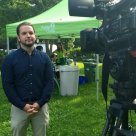Quebec’s back-to-school plan for a return to in-person classes on Monday continues to draw backlash from parents and teachers alike as cases and hospitalizations linked to the Omicron variant are set to peak.

Government and public health officials are adamant that the benefits of returning to school outweigh the risks.
Dr. Yves Jalbert, deputy director for public health in the Health Ministry, pointed to the negative impacts of distance learning observed during earlier waves of the COVID-19 pandemic as reasons to push for in-person classes. Some of the problems he cited were psychological distress, loss of motivation, academic delays, obesity, eating disorders, pathological screen use and increased family problems.
Westwood High School teacher Catherine Hogan agrees online teaching isn’t ideal but wonders about the timeframe.
“We’re not asking to be online for long extended periods of time,” she said.
“But while the province is still in the peak of the wave right now, we’re wondering if another week online may have allowed the numbers to drop a little bit, the hospitalizations maybe to drop a little bit. ”
Others are wondering the same thing.
“The whole idea of opening up schools abruptly when the cases have not started to come down yet is a little premature,” said Dr. Christos Karatzios, a pediatric infectious diseases expert.
COVID-stop, a collective of doctors and scientists, has put out a petition demanding in-person classes be delayed for at least two weeks.
They’re also pushing for more safety measures, including providing teachers with N95 masks if they ask for them.
Hogan said she’s already bought her own and some for colleagues ahead of Monday’s return, but noted they are quite expensive.
During a technical briefing on Friday, Jalbert said N95 masks are not necessary in schools.
Surgical masks, however, will be mandatory at all times, even during gym class, unless it’s being held outdoors. Students will be allowed to remove their face coverings to eat or drink.
While Jalbert admitted that N95 masks are designed to filter aerosols that surgical masks can let through, he said they can be hard to wear properly and for long periods, thus defeating their purpose.
Both Karatzios and physicist Nancy Delagrave, the scientific co-ordinator for COVID-Stop, disagree.
She cited a University of Michigan study in which people improperly wore the masks.
“It protected 6.25 times better than a surgical mask. And if they were fitted, it was 25 times better,” Delagrave said.
She also criticized the government’s back-to-school plan for not addressing aerosol and airborne transmission.
The government, however, maintains that schools across the province are safe and ready to receive students.
Just over 60 per cent of classrooms have carbon dioxide detectors used to measure air quality. High levels of CO2 indicate poor air quality, meaning the air could contain certain contaminants such as SARS-CoV-2 if someone in the class is infected with the virus.
Quebec says air filters to improve air quality are not needed in the vast majority of situations. Where there is no mechanical ventilation the government continues to recommend opening windows to improve air circulation.
“The Ontario government has installed 120,000 air cleaners. So we’re really behind. And actually, Ontario has one-fourth of the infections in school, so it’s working,” countered Delagrave.
Jalbert added that while the Health Ministry supports efforts to improve ventilation and comfort in schools, it doesn’t believe air quality is an important factor if other public health guidelines are followed.
Jalbert said the best protection against Omicron remains vaccination. He pointed to already high vaccination rates among teens, less severe health outcomes for children and the availability of third-dose booster shots for teachers as important factors behind the decision to allow a return to school.
He also said the monitoring of symptoms in students was essential in ensuring a safe return. Some 7.2 million rapid testing kits will be distributed in both grade schools and high schools throughout January and February.
If a student has symptoms, the student and all family contacts should isolate for five days. The student will need two negative rapid tests before they can return to school.
Jalbert explained the virus has more chance to spread within the family because masks aren’t used in the home.
Karatzios worries isolating for five days isn’t enough.
“Even though it’s positive, go because daddy and mommy have to go to work,” he said.
He feels like the government should have waited at least a week for booster coverage to improve.
As for Hogan, she’s “just kind of hoping for the best on Monday.”
— with files from The Canadian Press






Comments